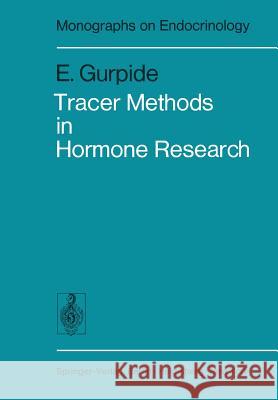Tracer Methods in Hormone Research » książka
Tracer Methods in Hormone Research
ISBN-13: 9783642808944 / Angielski / Miękka / 2012 / 190 str.
The purpose of this monograph is to describe theoretical aspects of the interpretation of data obtained from experiments performed with labeled hormones. Quantitative endocrinologic studies involving the use of tracers include the determination of rates at which hormones are secreted by endocrine glands and are produced outside these glands by conversion of other secreted hor mones. Tracer experiments are also performed with the purpose of measuring rates of metabolic reactions. These measurements reveal the contribution of secreted hormones to the formation of circulating compounds and urinary metabolites. The estimation of rates of fetal and placental production and exchange of hormones characterizes a class of in vivo quantitative studies performed with isotopically labeled hormones (radioactive or not). In addi tion, tracers are used to measure permeability and rates of reaction in in vitro systems, and to study the uptake of hormones by tissues, both in vivo and in vitro. The stability of the steroid nucleus carrying the isotopic label and the large number of reversible metabolic reactions in which steroids are involved, both facilitated and motivated the development of a sophisticated theoretical treat ment of tracer experiments in the field of endocrinology. Although the prac tical examples used to illustrate the concepts and calculations presented in this monograph involve labeled hormones, the theory is presented in a general symbolic manner and is applicable to other fields of investigation."











